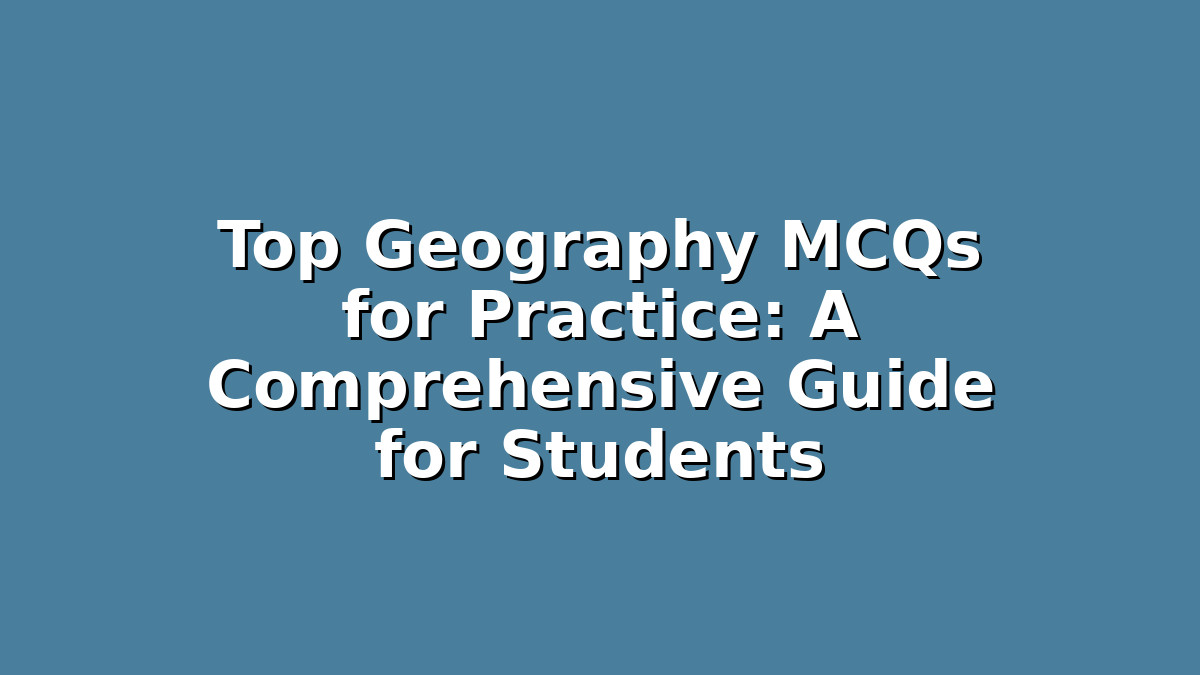Geography is a fascinating subject that explores the physical features of the Earth, human societies, and the relationship between them. Whether you’re preparing for school exams, competitive tests, or simply want to improve your knowledge, practicing multiple-choice questions (MCQs) is an effective way to boost your understanding and confidence. MCQs help you familiarize yourself with exam patterns, test your recall, and improve your time management skills.
In this blog post, we’ll explore some of the top geography MCQs for practice along with study tips tailored to help students maximize their learning. Whether you’re a beginner or looking to polish your skills, these strategies will guide you to succeed in your geography exams.
Section 1: Why Practice Geography MCQs?
Multiple-choice questions are widely used in geography exams because they allow teachers to assess a range of knowledge quickly and objectively. Here’s why practicing geography MCQs is particularly beneficial for students:
– Enhances Recall and Retention: Repeated exposure to questions helps reinforce key geographical facts such as country capitals, physical features, climate types, and cultural aspects.
– Improves Exam Strategy: MCQs train you to analyze options carefully, eliminate incorrect answers, and make educated guesses when needed.
– Boosts Time Management: Practicing under timed conditions helps you allocate time efficiently across questions during the real exam.
– Covers Broad Topics Quickly: MCQs allow testing on diverse topics like physical geography, political geography, environmental issues, and more in a single test.
To get the most out of MCQ practice, it’s crucial to adopt smart study habits, which we’ll discuss in the following sections.
Section 2: Top Geography MCQs to Practice and What They Cover
Here are some carefully selected MCQs to help you identify important topics and understand the kind of questions you might face. Try answering these questions on your own before checking the explanations.
1. Which is the largest desert in the world?
a) Sahara
b) Arabian
c) Gobi
d) Antarctic Desert
*Answer: d) Antarctic Desert*
*Explanation:* Although often overlooked, the Antarctic Desert is the largest desert, classified by its low precipitation.
2. What causes the seasons on Earth?
a) Distance from the Sun
b) Earth’s tilt on its axis
c) Earth’s rotation speed
d) Moon’s gravitational pull
*Answer: b) Earth’s tilt on its axis*
*Explanation:* The tilt of Earth’s axis causes different parts of the planet to receive varying amounts of sunlight throughout the year, resulting in seasons.
3. Which river is known as the longest river in the world?
a) Amazon
b) Nile
c) Yangtze
d) Mississippi
*Answer: b) Nile*
*Explanation:* While some debate exists, the Nile River is traditionally regarded as the longest river in the world.
4. What type of plate boundary is responsible for the formation of the Himalayas?
a) Divergent boundary
b) Transform boundary
c) Convergent boundary
d) None of the above
*Answer: c) Convergent boundary*
*Explanation:* The Indian plate collided with the Eurasian plate, causing the uplift that formed the Himalayas.
5. Which country has the highest population density?
a) India
b) Bangladesh
c) Monaco
d) Singapore
*Answer: c) Monaco*
*Explanation:* Monaco, though small in size, has an extremely high population density.
Section 3: Effective Study Tips for Mastering Geography MCQs
Mastering geography MCQs requires more than just memorizing facts. Here are some practical tips to help you study smarter and improve your performance:
#### 1. Create Thematic Mind Maps
Organize geography topics into visual mind maps covering themes like physical geography, human geography, climate zones, and more. Mind maps help you see connections between concepts and improve memory retention.
#### 2. Practice Regularly with Timed Quizzes
Set aside time daily or weekly to practice MCQs under exam-like conditions. Timing yourself encourages better pacing, helps reduce exam anxiety, and familiarizes you with the question format.
#### 3. Use Flashcards for Key Terms and Capitals
Flashcards are perfect for memorizing country capitals, mountain ranges, rivers, and definitions. Apps like Anki or Quizlet make creating and reviewing flashcards easy and interactive.
#### 4. Read Geography News and Updates
Stay curious about current geographical events such as climate change, natural disasters, and geopolitical developments. This contextual knowledge often appears in advanced MCQs and enriches your understanding.
#### 5. Analyze Your Mistakes
After practicing MCQs, carefully review the questions you got wrong and understand why. Learn from mistakes to avoid repeating them and identify weak topics that need extra attention.
#### 6. Group Study and Discussion
Discussing questions and concepts with peers can provide new insights and help solidify your understanding. Teaching others is also a powerful way to reinforce your own learning.
Conclusion
Geography is an exciting and dynamic subject that opens your eyes to the world around you. Preparing for exams with MCQs is not only effective but also enjoyable when you follow the right strategies. Start by practicing key questions like those above, and combine your efforts with smart study techniques such as mind maps, flashcards, and timed quizzes.
Remember, consistent practice and curiosity are your best tools. Don’t get discouraged by difficult questions; instead, view them as opportunities to learn and grow. With dedication and the right approach, you can master geography MCQs and confidently ace your exams.
Good luck with your studies and happy learning!

Responses